Search Results
Showing results 21 to 40 of 42

Marble Ride
Source Institutions
In this activity, challenge learners to design a roller coaster ride for a marble using cardboard and other simple materials.
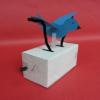
Cranking Bird
Source Institutions
In this activity, learners build a mini crank machine to make a bird "fly." This engineering activity introduces learners to automata, rotational motion, cranks and cams.
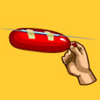
How Do Probes Get To Space?
Source Institutions
Investigate how force and thrust work to propel rockets into outer space. Build a rocket: a blown-up balloon taped to a drinking straw threaded through some string.

Thrill Ride
Source Institutions
In this activity, learners will build a roller coaster for a marble to run on using everyday household materials such as paper towel or toilet paper rolls, cups, boxes, books, buckets, chairs, etc.
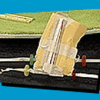
Puff Mobile
Source Institutions
In this engineering activity, challenge learners to design a car using only 3 straws, 4 Lifesavers™, 1 piece of paper, 2 paper clips, tape, and scissors.
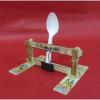
Catapult
Source Institutions
In this activity, learners build mini catapults using paint paddles and a spoon. Use this activity to introduce learners to forces and projectile motion.
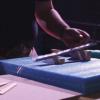
Chain Reaction II
Source Institutions
In this hands-on activity, learners use an assortment of (mainly household) items to complete Rube Goldberg-type challenges.

Pop Fly
Source Institutions
In this design challenge activity, learners invent a way to send a Ping-Pong ball flying high enough to catch it - like football with a twist!
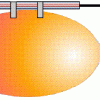
An Object in Motion
Source Institutions
In this physics activity (page nine of the pdf), learners use balloons to explore how a rocket works. It is suggested they also work to see how they can alter the velocity of the rocket.
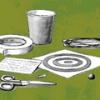
On Target
Source Institutions
In this design challenge activity, learners modify a cup so it can carry a marble down a zip line and also drop it onto a target.
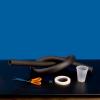
Build a Roller Coaster
Source Institutions
Learners design and build a roller coaster using simple materials. Learners experiment with potential and kinetic energy to get a marble to follow a track into a cup.

Balloon Car
Source Institutions
In this physics activity, challenge learners to make and race a balloon-powered car. Learners construct the body out of a paper cup, wheels out of wooden spools. and fuel tank out of a balloon.

Pencil Balance
Source Institutions
In this activity, challenge learners to make a pencil stand on its tip using only two pieces of wire and two clothespins. Use this activity to demonstrate the center of gravity.
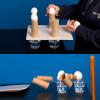
Egg Drop
Source Institutions
Perform this classic inertia demonstration to illustrate the transfer of potential energy to kinetic energy.
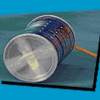
Spool Racer
Source Institutions
In this physics activity, challenge learners to make a rubber band-powered spool racer. Demonstrate principles of motion as well as potential and kinetic energy.

Snake
Source Institutions
In this physics activity (page 4 of the PDF), learners will construct their own spiral "snake" and use it to explore the relationship between heat and kinetic energy.

Can Car
Source Institutions
In this physics activity, challenge learners to make a race-car out of a coffee can and rubber band. Demonstrate motion, forces, kinetic and potential energy and friction.

Make a Comeback Can
Source Institutions
Learners build a can that automatically returns after being rolled away. The can has a rubber band inside that stores energy as the can rolls one direction.
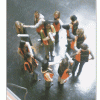
Running in Circles
Source Institutions
In this group activity, learners use some common objects and work together to simulate the Coriolis effect. During the challenge, learners make predictions and test different scenarios.
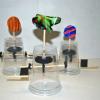
Micro Automata
Source Institutions
In this activity, learners build small animated toys that move.
